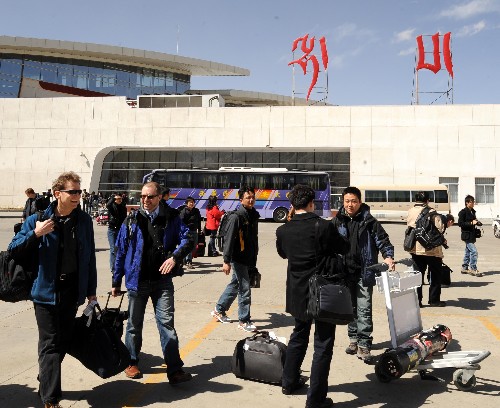The 65-km bus drive from Gongga airport to downtown Lhasa is very pleasant - the Lhasa River flows quietly along the highway, with wild ducks swimming around leisurely.
However, as I set foot on the roof of the world, I found it hard to link the apparent tranquility with riots that left 19 people dead nearly two weeks ago.

More than 30 reporters from Chinese mainland, Hong Kong, Taiwan and overseas news organizations yesterday in Lhasa, capital of the Tibet Autonomous Region, to cover the post-riot situation in the city. The three-day trip is being organized by the Information Office of the State Council.
I am a member of the first group of Chinese and foreign journalists allowed to visit the capital of the autonomous region after the March 14 violence, during which rioters killed and attacked people, and looted and destroyed property.
The ruins of burnt department stores and other buildings stand in mute testimony to the nightmare.
But people in and around Lhasa have begun resuming normal life. On the outskirts, farmers are busy in their fields, while in the downtown area, business is brisk.
The Potala Palace reopened to tourists yesterday, with many people strolling around Potala Square and others worshipping before the palace which overlooks the square.
Drolma, a 53-year-old Tibetan, who used to walk half an hour every day to worship at the palace, is happy to be able to do so again now that calm prevails.
"I pray for the well-being of all people, and I hope Lhasa will remain stable forever," Drolma said.
Chen, a Lhasa resident who only gave her surname, said: "I don't think there will be riots again. We have been cooped up at home for days, so I have brought my son out for a walk."
Her simmering anger at the rioters was evident, though.
"I have seen the city become really well-off and stable during the eight years I have lived here. I was really furious when rioters ruthlessly damaged our peaceful life," Chen told China Daily.
"I think the riots were organized. No one has the right to destroy our peaceful life," Chen said.
Her 7-year-old son Li Fasheng, too, has not been able put the terror out of his mind.
"It was horrible," the boy said, but added: "I am not afraid any more."
Small groups of policemen could be seen patrolling the square, and some police vans drove along major roads.
Most of the debris of the March 14 riots has been cleared, and the majority of businesses are operating as usual.
Yet the shells of the burnt stores on the previously-busy Beijing Road and Qingnian Road still make passers-by uneasy.
In front of Yi Shion fashion shop on Beijing Road, where five women in their early 20s were burnt to death by rioters, candles and white lilies were placed to mourn the loss of innocent lives.
(China Daily March 27, 2008)